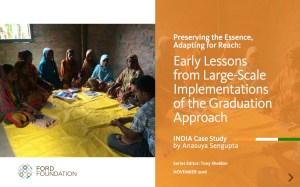Graduation Approach Case Study: India
The challenge
In India, despite its fast growing economy, over 233 million people live below the poverty line. As in many countries, the largest proportions of the poorest in India are religious and ethnic minorities. With extreme poverty compounded by the caste system, the poorest are typically landless, chronically food-insecure, and earn their income primarily from seasonal livelihoods or daily wage labor. While poverty reduction is a national priority, social welfare programs have had very limited outreach to very poor households. Since 1999, India has tried to address poverty through programs to improve access to microcredit and, more recently, to deliberately target the extreme poor.
What we did
India was one of the eight countries included in the first efforts by the Ford Foundation and the Consultative Group to Assist the Poor (CGAP) to adapt and test the Graduation Approach. Between 2007-2009, the non-governmental organization Bandhan Konnagar implemented the Targeting the Hard Core Poor (THP) pilot with 300 female participants for 24 months in Murshidabad, one of the poorest districts of West Bengal. The THP program is a grant rather than credit-based targeted approach that offers time-bound support to address multiple issues associated with severe income poverty. For the THP pilot, Bandhan Konnagar’s vision was to enable the poorest to “graduate” into financial services after their urgent consumption needs had been met and they had a sustainable livelihood, rather than leading with financial services as the self-help group model does.
As of early 2016, this program was operational in seven states. While the chief components of the THP program remain in place, Bandhan Konnagar has made some strategic and operational iterations based on learning from the field as the program expanded to other regions far from the headquarters in Kolkata, West Bengal.
What We Learned
The rate of successful graduation from the Bandhan Konnagar pilot was 98 percent. In a randomized control trial (conducted by Jameel Latif Poverty Action Lab, in collaboration with Institute of Financial Management and Research and Innovations for Poverty Action), an endline survey done a year after program completion found that treatment households had an increase of 25 percent in the per capita consumption expenditure and there was an obvious jump in their productive asset base. They were found to be less insecure, happier, and reported an overall improvement in their health. The report found a significant decrease in income from agricultural wage labor, marking a successful shift in livelihoods. There was no significant impact on physical health, empowerment, or willingness to take calculated risks (such as likelihood of accessing credit).
Key lessons learned include:
- The program is cost effective and its outcomes are sustainable, however, it could better target vulnerable households. The benefits of the programs were estimated to be higher than the costs in five out of six sites, ranging between 133 percent to 433 percent return on investment. However, including all the poorest households with able-bodied adults has been found to be neither the most effective nor the most financially sound approach. Efforts should be made to identify those households who not only need the Graduation program the most but are also the most likely to succeed in it.
- Appropriate weight must be given to contextual factors to gauge the extent and nature of household poverty. Participant selection is a crucial step to successfully implementing the THP program. While Bandhan Konnagar found a strong correlation between extreme rural poverty and the absence of a responsible and proactive male household member, care should be taken so as to not exclude a large number of vulnerable households based on this and other limiting criteria.
- The ideal implementation period is 36 months, allowing 24 months after asset transfer for livelihoods development. However, Bandhan has found it difficult to secure funding for such an extended program period.
- Entry into financial services as a sole graduation criterion does not reflect the holistic achievements of an extreme poor household. Sustainable graduation criteria should encompass a range of context-relevant economic and non-economic achievements at the end of the program cycle.
